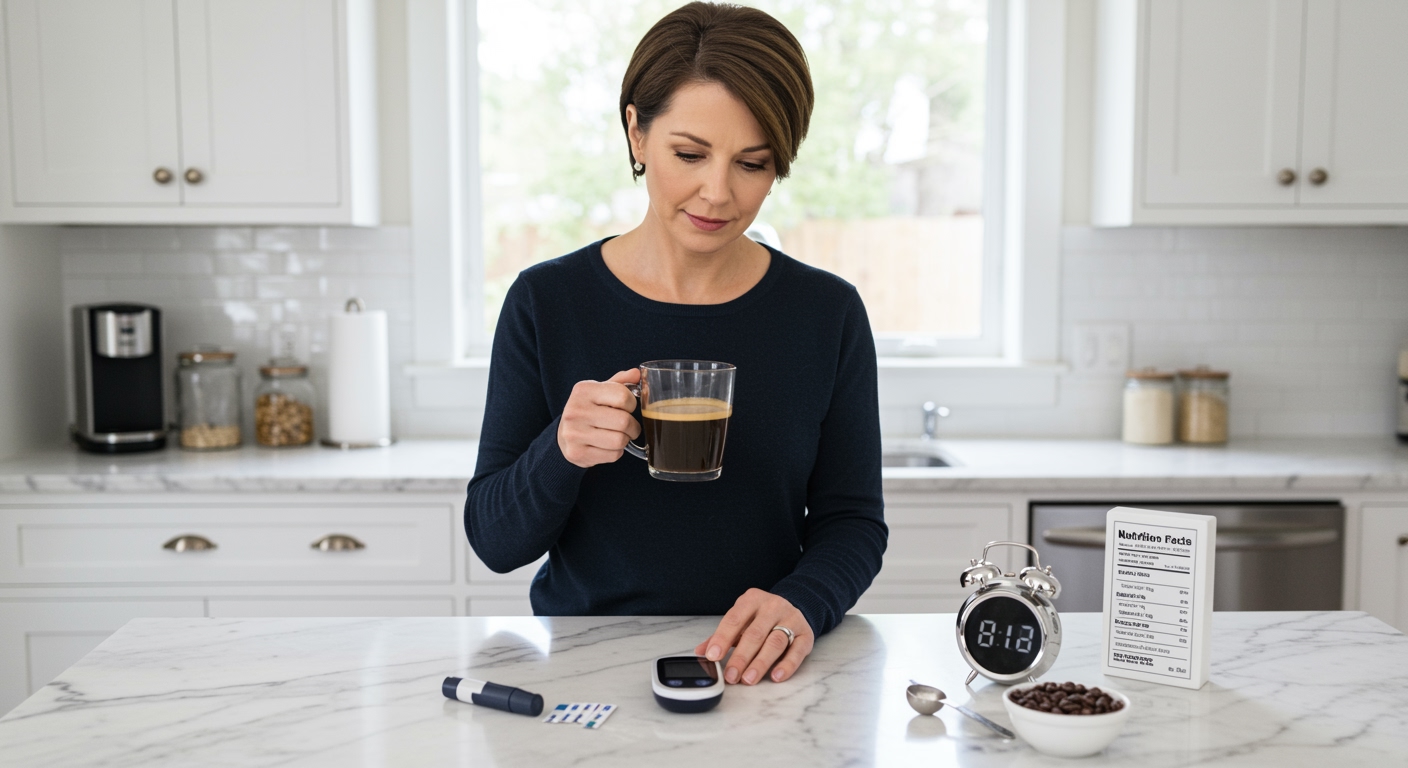✪ Key Takeaway: Black coffee can be beneficial for diabetes when consumed after meals, but may spike blood sugar when drunk on an empty stomach.
Introduction
Your morning coffee ritual might be sabotaging your blood sugar control without you even knowing it.
You probably wonder if that steaming cup of black coffee is helping or hurting your diabetes management efforts.
Hi, I’m Abdur, your nutrition coach and today I’m going to explain exactly how black coffee affects your blood sugar and when you should drink it for optimal diabetes control.
Does Black Coffee Raise Blood Sugar Levels?
Black coffee contains virtually zero carbohydrates and should not directly raise your blood glucose levels.
However, caffeine can trigger your body to release stress hormones like cortisol and adrenaline.
These hormones signal your liver to release stored glucose through a process called gluconeogenesis.
This means your blood sugar can rise even though coffee itself contains no sugar.
The timing of when you drink coffee makes all the difference in how your body responds.
Research shows that drinking coffee on an empty stomach can increase blood glucose by 8-15% in people with diabetes.
✪ Fact: Caffeine sensitivity varies greatly between individuals, with some people experiencing blood sugar spikes while others see no change.
When Should Diabetics Drink Black Coffee?
The best time to drink black coffee is after eating a balanced meal, not before.
When you drink coffee after breakfast, your body is already processing food and your insulin response is active.
This helps counteract any potential blood sugar rise from caffeine.
Studies indicate that having coffee with or after meals can actually improve glucose tolerance in some people.
Avoid drinking coffee first thing in the morning on an empty stomach.
Your cortisol levels are naturally highest in the morning, and adding caffeine can amplify this stress response.
Wait at least 30-60 minutes after eating before having your coffee for optimal blood sugar control.
✪ Pro Tip: Monitor your blood sugar before and after coffee for one week to understand your individual response pattern.
What Are The Benefits Of Black Coffee For Diabetes?
Black coffee contains powerful antioxidants called chlorogenic acids that can improve insulin sensitivity.
These compounds help your cells respond better to insulin, making it easier to control blood sugar levels.
Regular coffee consumption has been linked to a reduced risk of developing type 2 diabetes in healthy individuals.
The magnesium and chromium in coffee support glucose metabolism and insulin function.
Coffee also contains compounds that may help protect the pancreatic beta cells responsible for insulin production.
Some studies suggest that moderate coffee intake can lower inflammation markers associated with diabetes complications.
The key is drinking it black without added sugars, creamers, or artificial sweeteners that can negate these benefits.
✪ Note: These benefits apply to moderate consumption of 2-3 cups per day, not unlimited amounts.
How Much Black Coffee Is Safe For Diabetics?
Most diabetes experts recommend limiting coffee intake to 2-3 cups per day for optimal safety.
This equals approximately 200-300 mg of caffeine, which is considered a moderate amount for most adults.
Start with one cup and monitor how your body responds before increasing your intake.
Some people with diabetes are more sensitive to caffeine and may need to limit consumption to one cup daily.
Pay attention to your blood pressure as well, since caffeine can temporarily raise blood pressure in some individuals.
Avoid drinking coffee late in the day as poor sleep quality can worsen insulin resistance.
If you experience jitters, anxiety, or significant blood sugar spikes, reduce your coffee consumption immediately.
✪ Pro Tip: Switch to decaf in the afternoon to maintain the antioxidant benefits without disrupting sleep patterns.
What Should You Avoid Adding To Coffee?
Never add sugar, honey, or any sweeteners to your coffee as these will directly spike your blood glucose.
Commercial coffee creamers are loaded with hidden sugars and trans fats that can worsen insulin resistance.
Even artificial sweeteners may disrupt your gut bacteria and potentially affect glucose metabolism.
Flavored syrups contain massive amounts of sugar and should be completely avoided.
Whole milk adds unnecessary lactose (milk sugar) that can raise blood glucose levels.
If you must add something, use a small amount of unsweetened almond milk or heavy cream.
The goal is to keep your coffee as close to black as possible to maximize benefits and minimize blood sugar impact.
The Bottom Line
Black coffee can be a safe and beneficial part of your diabetes management plan when consumed at the right time and in moderate amounts.
The secret to coffee success with diabetes lies in timing, not elimination – drink it after meals rather than on an empty stomach.
I would love to hear about your experience with coffee and blood sugar in the comments below – share what works best for your diabetes management routine.
References
At NutritionCrown, we use quality and credible sources to ensure our content is accurate and trustworthy. Below are the sources referenced in creating this article:





